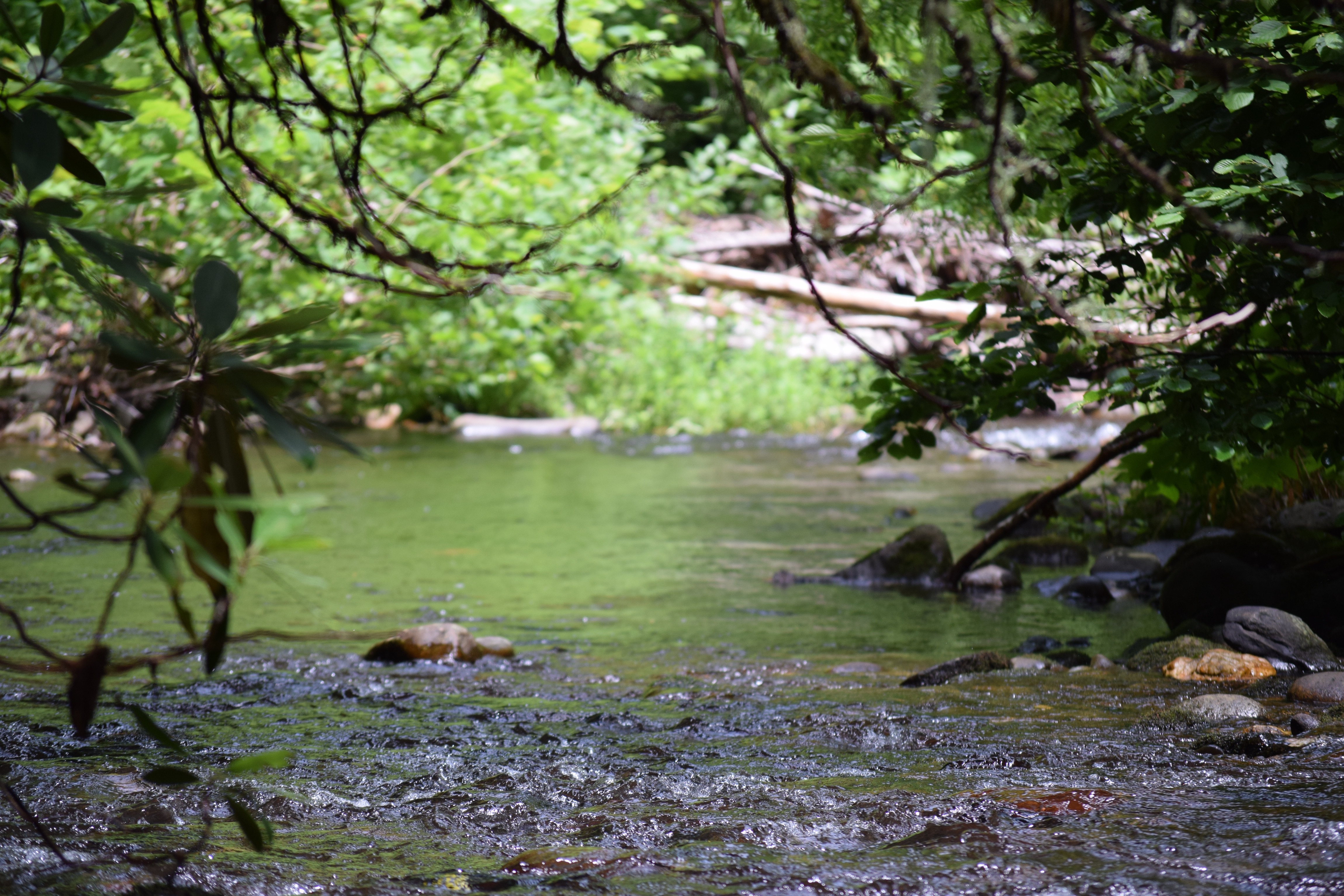A lawsuit filed this month by several Southern Appalachian conservation groups seeks to reverse the Trump administration's elimination in November of certain requirements for logging, road building and utility right-of-way projects in national forests.
The U.S. Forest Service - under orders from former President Donald Trump to open more publicly owned forests for timbering - finalized changes to National Environmental Policy Act rules in November.
The Southern Environmental Law Center represents nine conservation groups in a lawsuit opposing the loosening of requirements. They say the changes eliminate transparency, public input and science-based review from many of the agency's most environmentally consequential decisions.
"In short, the forest service's rule allows more commercial exploitation with less public accountability, and that's a terrible shift in balance," said Sam Evans, leader of the law center's National Forests and Parks Program.
"National forests, and especially those in the Southern Appalachians, are resources for everybody. But the Trump administration wants to give logging lobbyists louder voices than the rest of us," Evans said.
Former U.S. Secretary of Agriculture Sonny Perdue praised the changes when they were finalized in November.
"These changes will ensure we do the appropriate level of environmental analysis to fit the work, locations and conditions," he said in a Nov. 18 statement. "The new categorical exclusions will ultimately improve our ability to maintain and repair the infrastructure people depend on to use and enjoy their national forests - such as roads, trails, campgrounds and other facilities."
Defenders of Wildlife federal lands director Peter Nelson called on President Joe Biden to find a way to reverse course.
"On its way out of office, the Trump administration has attempted to roll back the very law that ensures the American people have a voice in decisions affecting our national forests and the wildlife that depend on them," Nelson said. "We ask that the Biden administration create a new way forward for our national forests and uphold the original intent" of the 1970 environmental law.
On Friday, Evans said the plaintiffs are waiting to be contacted by the Biden administration's Department of Justice, while White House officials couldn't say whether the revisions were on the president's radar yet as he issued a flurry of executive orders this week reversing other Trump actions.
The 92-page lawsuit was filed Jan. 8 in U.S. District Court in Big Stone Gap, Virginia, by the center's attorneys on behalf of the Clinch Coalition, Alliance for the Shenandoah Valley, Chattooga Conservancy, Cherokee Forest Voices, Defenders of Wildlife, Georgia ForestWatch, MountainTrue, Virginia Wilderness Commission and Wild Virginia Inc.
It names the U.S. Forest Service and certain Trump administration officials as defendants.
 Staff file photo by Ben Benton / A proposed logging project along Tumbling Creek, a trout stream in the mountains west of Copperhill, Tenn., in the Cherokee National Forest, was halted after conservationists filed suit in 2018 over worries timbering there could cause significant damage to environment. A Trump-era rule change in November eliminated safeguards involving public input under the National Environmental Policy Act that protects national forests from unneeded, ill-conceived and destructive logging, road building and utility right-of-way projects. Conservationists filed suit to reverse the change earlier this month.
Staff file photo by Ben Benton / A proposed logging project along Tumbling Creek, a trout stream in the mountains west of Copperhill, Tenn., in the Cherokee National Forest, was halted after conservationists filed suit in 2018 over worries timbering there could cause significant damage to environment. A Trump-era rule change in November eliminated safeguards involving public input under the National Environmental Policy Act that protects national forests from unneeded, ill-conceived and destructive logging, road building and utility right-of-way projects. Conservationists filed suit to reverse the change earlier this month.Before the November finalization of the rule, members of the public were provided avenues for their voices to be heard in support or opposition without regard to an activity's size.
The finalized rule includes several new thresholds for "categorical exclusions," meaning projects that won't require an environmental assessment or an environmental impact statement.
The rule changes provide such an exclusion for commercial logging projects up to 2,800 acres and up to 3 miles of logging roads; up to 2 miles of permanent road construction for any purpose; and "special use" authorizations for private uses affecting up to 20 acres of public lands, the lawsuits states.
Those limitations apply only to one decision, but the categorical exclusions "can and will be used again and again to authorize successive projects," the suit states. Multiple projects with the same categorical exclusion could take place in the same area over time so long as each individual project doesn't exceed 2,800 acres.
"Under the new rule, that public oversight would be lost for nearly every logging project in the Southern Appalachian forests of Virginia, Tennessee, North Carolina and Georgia," the lawsuit states.
On Thursday, Babete Anderson, forest service spokesperson in Washington, D.C., said officials couldn't comment on pending litigation.
But the agency gives the reasoning behind the change on its official website regarding NEPA revisions.
The rule change "will help the forest service make timelier decisions based on high-quality, science-based analysis. This improves the Forest Service's ability to get work on the ground while meeting our environmental stewardship responsibilities. The updates in the proposed rule incorporate lessons learned and experience gained from our staff and partners over the past 10 years."
The move is part of forest service efforts "to create more resilient landscapes and better serve the public by focusing our land management efforts across boundaries and modernizing our internal processes."
The forest service held public roundtables around the country in 2018, including one in Chattanooga. Conservationists attending that meeting said the public wasn't notified of it until the last minute. That led to a July 2019 rally against the changes in Atlanta at the agency's regional headquarters.
The roundtable in Chattanooga was held the same month the forest service dropped a Cherokee National Forest timbering plan near Tumbling Creek in Polk County, Tennessee, after conservationists successfully filed suit in opposition under previous environmental rules.
While most of the 40,000-plus public comments solicited on the rule change in 2019 were in opposition, there was at least one supporting comment.
"With 80 million acres of National Forest System land at risk of catastrophic wildfire, the forest service must move more quickly to restore our overgrown and fire-prone forests using active management tools such as logging, thinning and prescribed burning," an unidentified person commented.
Opponents said the rule change threatens what will be left for future generations.
Georgia ForestWatch executive director Jess Riddle said the rule "undercuts the critical role people like me and organizations like Georgia ForestWatch play in preserving balance in our national forests," and he worries it allows many logging operations to move forward without review by cutting large projects into smaller ones.
Public oversight works, Cherokee Forest Voices director Catherine Nell Gidens Murray said.
"I have personally seen the difference an informed public can make on forest management," she said.
"Some projects have not been controversial," she said. "On the other hand, some projects have been very bad as proposed but have changed dramatically to avoid harm and to satisfy public concerns.
"Taking away the public voices responsible for those improvements would be a huge mistake."
Contact Ben Benton at bbenton@timesfreepress.com or 423-757-6569. Follow him on Twitter @BenBenton or at www.facebook.com/benbenton1.
